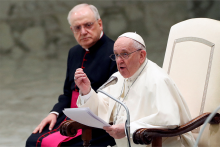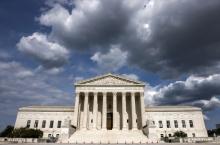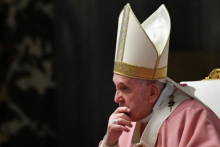LGBTQ

In the summer of 2009, when I was 12 years old, a street racer crashed into my grandparents' minivan. The accident, by all means, should have killed my grandad, who was in a coma for several weeks after the crash. While undergoing emergency surgeries, he lost 98 units of blood in six hours — about the blood of 10 people. They were pumping blood into him as fast as it was coming out. Ever since that day, blood donation has held a place close to my heart.

But while my ethical objections led me to atheism, my trauma led me back to Christ. Simply put: I had a relapse and sought out a faith community because I needed to be around people. Praying helped. Being around people helped. Devoting myself to something bigger than myself and to Christ on the cross was an incredible comfort while I searched for effective medical treatment.

Through reclaiming missing stories and telling our own stories in terms that undermine dominant narratives, we affirm our humanity and agency, our ability to resist and interpret our lives as meaningful. We must theologically interrogate the way we tell stories and the temptation to censor marginalized people’s perspectives and histories in favor of a dominant narrative. This is because stories cut to the heart of how humans, created in the image of God, make meaning out of what happens to us.

March 31 marks the annual International Transgender Day of Visibility. I will confess that I only recently became aware of this day, which is “dedicated to celebrating the accomplishments of transgender and gender nonconforming people while raising awareness of the work that still needs to be done to achieve trans justice,” as GLSEN, an organization that advocates for LGTBQ issues in K-12 education, puts it.

We are currently in the midst of what the American Library Association condemned in November as “a dramatic uptick” in efforts to challenge or remove certain books from libraries and schools. Many of these censorship efforts have been led by conservative Christians and conservative politicians who are concerned these books will dissuade their kids from embracing what they call “Judeo-Christian values.” But as Ryan Duncan explained, Christians are deluding themselves if they believe banning stories about gender, race, or sex will halt their kids’ curiosity. Ban ’em or burn ’em, these books will not disappear and kids will continue to seek out resources on these topics — to some parents’ chagrin.

Over the course of three school board meetings in the months that followed, parents argued that the books’ sexual content constituted “pornographic” material that didn’t belong in schools. Many parents cited their Christian values and rights as reasons why they spoke out against the books.

It’s certainly ironic, but as much as the news can get me down it can also lift me up. Yes, legislators are attempting to censor books that teach about racial (in)justice and human sexuality — Weeble down. But these lawmakers’ attempts to censor theories are only resulting in increased interest and open-mindedness among their constituents — Weeble up!

A prominent liberal cardinal who leads a body representing European bishops has called for “fundamental revision” in Catholic teaching on homosexuality, and said it is wrong to fire Church workers for being LGBTQ.

Pope Francis said on Wednesday that parents of LGBTQ children should not condemn them but offer them support. He spoke in unscripted comments at his weekly audience in reference to difficulties that parents can face in raising offspring.

When Angela Jordan started homeschooling 21 years ago, she was Abeka all the way.
It didn’t take long, though, for Jordan to realize that Abeka — the conservative Christian curriculum popular in homeschooling and in private Christian schools — presented a take on history intent on downplaying racism, white supremacy, and sometimes just plain facts.

Shepherding God, be palpably present with us when we dance, snuggle, and enjoy the sensations of the creation you declare good.
Help us to name, define, redefine, deconstruct, claim, and properly pronoun our fabulousness. We commit to properly naming and pronouning the fabulousness of others.

June 30 marks the end of Pride Month, and Beloved Arise is closing out celebrations with its second annual Queer Youth of Faith Day. The organization, dedicated to LGBTQ youth of faith, is joined by several co-hosts, including LGBTQ youth suicide prevention organization The Trevor Project, LGBTQ advocacy organization PFLAG, Jewish Queer Youth, Q Christian Fellowship, and Interfaith Alliance.

Greater support for women and LGBTQ rights aligns with greater religious freedom protections. A study by Brian J. Grim at the Religious Freedom and Business Foundation found that “the average level of religious freedom is 36% higher in the countries with higher levels of support for LGBT rights than in countries with low levels of support for LGBT rights.” The expansion of human rights is good for religious freedom. This shouldn’t surprise us: A culture that values human rights for women and LGBTQ people will also value human rights for religious people.

“I think there are aspects of people attempting to discuss politics in Christian terms, or people interpreting their politics through a Christian lens, that’s always going to lead to terrible arguments,” she said. God cares about politics, Coaston said, but not in such a literal way that God has an opinion on something like Medicaid expansion. To those using God-talk to drum up votes, Coaston asks: “Why would you want God to be that small?”

The Supreme Court ruled unanimously on Thursday that Philadelphia violated Catholic Social Services’ religious freedom by not placing children with the agency after CSS refused to place foster children with married same-sex couples.
“The refusal of Philadelphia to contract with CSS for the provision of foster care services unless CSS agrees to certify same-sex couples as foster parents violates the Free Exercise Clause of the First Amendment,” Chief Justice John Roberts wrote in a narrow decision.

Allow us to steal a few minutes of your attention for stories that will steal your heart.

We wander round searching for demons
and making them of each other
when we find none. Out of feigned necessity,
the slightest difference becomes a reason
to tame—to vanquish—to stamp out until
we look up and catch sight of ourselves:

The ruling was a response to practices in some countries where parishes and ministers have begun blessing same-sex unions.

The contemporary Christian music industry has been adamantly opposed to affirming LGBTQ+ people. But Semler's EP Preacher's dares to include songs about queer sexuality, lesbian weddings, and Christian faith.

I don’t live with the illusion that the holidays are cheery for everyone. Many of us find ourselves interacting with family and friends who do not have the same values we do. Here are four tips for navigating difficult relationships over the holidays — without compromising on dignity.